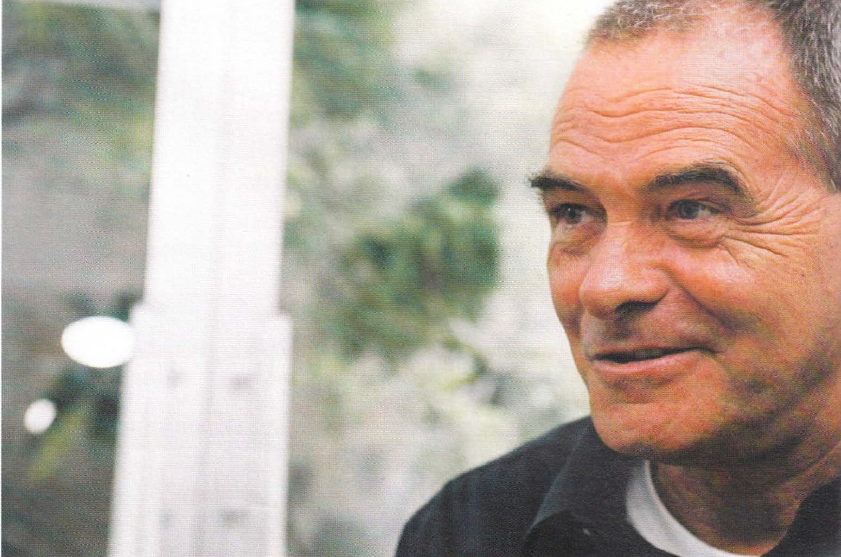Advertising guru, Jim Aitchison, The former Executive Creative Director of the Batey Ads Group, discontinued a very successful career in advertising after 20 years to pursue his passion for writing books. He tells Harin Fernando of Business Today, the importance of recognising and valuing the consumer.

The balance between self-indulgent award-winning creativity and the cause of selling a product?
A lot of advertising that wins awards has been proved to be effective. A lot of people think effective advertising means dull advertising, simply put a price and the product details and that’s it, but advertising these days has to do a lot more. It has to build a brand and also obtain a sales response, but advertising’s real role is to build a brand; that is the purpose of advertising. Anyone can just write an advertisement in the local paper saying ‘save 90%,’ etc. you will get a response, but building a brand is more complex. That is why we consider that any advertising should be brand building. In that context what is effective? You have to know what your long-term goals are.
The toughest thing these days is to get attention. To this end you are using all your creative resources and all your skill to get attention and make people fall in love with the brand. This is really what you have to do and there are many ways to do it, being indulgent is not one of them. Because when I do an advertisement I am not there to entertain myself, I am there to communicate something about a brand, or I am there to offer some benefit which has to be relevant to the reader. If I am just there trying to win an award and trying to entertain myself or trying to do something I want, it may not engage with the consumer, but this is where people get mixed up. They think that creative advertising is indulgent and it is not, if you do an indulgent campaign and send it for an award, you probably wont get an award, because judges recognise the difference between genuine and indulgent creative. There is a trend to create advertisements for awards.
A lot of people believe that young people in particular, want to win awards, so that their careers will take off. Their motivation is that ‘I want to win awards, so I can become more famous and make more money.’ Essentially I think it is very important to realise that you can’t really con anybody, and indulgent advertising is the worst thing you can do where you’re just entertaining yourself and consumers wont, be engaged by that. Consumers know the difference as well. If you’re a consumer you know when someone is talking down to you in an advertisement; we all can spot that. I think a lot of advertising is like that, it talks down to you and treats you like an idiot, and as a result the brand suffers.
I think of all the great brands in the world, Mercedes Benz for example. It has a long tradition of engineering excellence, so you can’t be playing the fool; every advertisement has to build and serve the brand and the image of Mercedes Benz. You would never be indulgent with such a brand, you think about the owner and the product, and try and build a link between the two.
Given that the process of brand building takes time, would you advise this strategy for new market entrants with long-term ambitions?
It depends on who you are. If you are going to launch a new computer brand, you have got to know in your mind what this new product and brand is going to be about and what the point of difference is. If you’re launching a sports shoe, you need to know; why is my shoe going to be different from Nike or Adidas? You have to establish these points of difference and plan and create a persona for your brand, right from the outset. You also have to be very careful. You have to find a niche in the market and go after that and nobody in his or her right mind just launches a product. They know whom they are targeting. They probably had a brilliant idea one day of what this product should be, they know there is a gap in the market and they are going to fill that gap, so therefore when they build the brand, everything from pack design to the advertising has to reach that target audience and appeal to those people. Without a brand you are nothing; you’re a commodity.
Brand building is about ‘communities’ of users and when you see brand building in that context, it becomes very clear what your mission is as a marketer. For example, the Apple community or BMW or Harley Davidson is very strong and people only leave the community when the brand lets them down. That was the case with Nike, when the consumers felt cheated and switched brands, but most people buy a brand and do not change it that often. As a consumer, you have your favourite brand and you feel uncomfortable without it. Your mission as an advertiser or marketer is to build a community and make it bigger and bigger, stop people leaving and pull people in.
Do you think marketers often underestimate the sophistication of audiences/readers?
All the time. I have always said that. People turn around and say, ‘It is easy for you to say that because you don’t have to deal with my market,’ but as a writer, when I started writing children’s books, I realised how important it was to treat children like adults; you use big words and interesting plots and you will be surprised to see that they buy more and more books. They realise the difference; here is someone who is treating me like a person. Nobody likes being talked down to, but its very hard to convince some clients and agencies that you can trust the audience and say ‘its okay, they will figure it out.’
The impact of experiential marketing and its effect on privacy and the way in which advertisers and marketers operate?
I think people have radars, and if you are making a brand that is of no relevance to me, I won’t even see it, I won’t even know it is out there it does not even touch me; so relevance is key here. If I am an Apple user and I love Apple, I use Apple, and therefore I am an Apple person, so everything has to be compatible with Apple. I get quite passionate about that. If you are another computer company I would not be interested, because I have already made my choice, but anything from Apple, I will read. If I drive a Mercedes Benz I am very passionate about Mercedes and I want to know more; ‘If there is a new model tell me.’ If you are BMW sending me a brochure, I probably do not want it. The brand is only there, if you want it to be there and I believe consumers these days are very smart, whether they’re in Sri Lanka or Sydney. They can screen stuff out.
Consumers sometimes feel like slaves to brands and try to move out by buying organic and ethically sourced goods. To what extent is this valid?
Organic products have become brands as well. If you go to a supermarket you will find a range of organic breads and breakfast cereals, so they become brands in their own right. I feel a lot of people are exploited by brands and that is something marketers have to take into account, and that is why you do not talk down to people. Consumers are very marketing-literate people, they have seen all the different ways we talk to them and they want their brand to respect them. The basic premise is that ‘you buy into a brand and unless that brand really lets you down, you will keep buying that brand,’ perhaps until something better comes along. Normally brands lose their customers because of something that they do that’s is wrong. So concepts like 360 or experiential marketing are important, but consumers have many defence mechanisms to nullify them. The basic rules is that when you deliver something to somebody and it meets or exceeds their expectations, they will keep coming back, until you do something wrong.
How important is a single big idea in the creative process? If I threw 6 tennis balls at you, you would be lucky if you caught one. So if I take a 30-second commercial and put six different messages in it, which one are you going to remember? Probably none. So you have to do a commercial or press advertisement with one single thought in it. Put the internet link at the bottom and let the consumer discover more on the website. Do not try and make a 30-second commercial like a catalogue, because it just can’t be done; you can’t throw six balls at someone and expect them to catch all six. They won’t you will end up with a very messy piece of confusing communication and smart marketers all over the world know that most of the great commercials and advertisements are all focused on one single ‘big idea thought.’ In a campaign you could talk about the six different aspects of a brand, but it is usually linked by one theme and maybe six different aspects (looks) of the brand, but not all in one advertisement.
A possible benchmark for creativity?
A lot of people try to do this and it is very hard to rank advertising. If you’re pitching an advertisement to a client, they either like it or don’t. I think the most important thing these days is that an advertisement has some emotional connection with its audience, and the people who approve the advertising have to know the audience very well. They have to take themselves out of the measurement process and be able to say ‘I know my customers very well’ and having seen this advertisement ‘yes’ this advertisement connects, or ‘no’ its totally irrelevant and in the wrong tone of voice, the people wont like it and it is contrary to what they think about the brand. Every good marketer knows his or her audience very well and you would not offer up to them something that was not relevant. The same goes for an advertisement, why would you put in something irrelevant or indulgent when you are talking to a very focused target audience.
What can we in the east learn from the west when it comes to selling, advertising and marketing?
What you learn are principles. If you’re going to tell a story there must be characters, a plot, a beginning, middle and end. There are certain things a good advertisement should have; a good press advertisement should have clarity, simplicity and an arresting image, but these are givens. So if you go against these principles, be it in the west or in the east, you create a horrible advertisement that no one will notice. What has been proved now, over the last 20 years in Asia, is that people in Asia can do advertisements that are as good as or better than the west, just look at places like China, India, Singapore or Thailand, all who are consistently now winning awards. Every country that engages in great creative advertising; simply studies the principles and then applies them to their own culture. So a good Sri Lankan advertisement will have all the basic elements, such as a single-minded message etc. but it will be expressed with Sri Lankan humour, elements of Sri Lankan culture and become something that only Sri Lankan culture can produce.
How do you see the irony of the existence of industry awards that recognise either creativity or effectiveness, after all can one exist without the other?
I have previously judged effectiveness awards. In these awards you enter the campaign but you also provide the background, the strategy and audited sales results. It all has to be audited and verified. It not good enough to say ‘our sales went up 50%,’ you have to have an audited statement of how sales rose in connection with the advertising, when did it begin etc. and it must be all plotted out. The judges are usually very senior marketing people and they can spot the phoneys, they say ” ‘that is ridiculous, there is no way you (the campaign) can do that,’ ‘that is such a boring advertisement, there is no way it (the ad) could have produced such a result’ ‘maybe there was something else happening’,” It is very hard to pin effectiveness to one or two specific advertisements. Maybe something else happened, maybe your competitor burnt down? One thing you have to remember is that advertising is a very long-term process, good brand building might take 10 – 20 years, you can’t just think it is going to happen in a minute. In my experience judges of effectiveness awards always looked at the creative, in relation to the claimed effectiveness and they were very cynical and wanted to see exciting creative work and exciting effectiveness both at the same time.
What role can the marketing and advertising fraternity play in resolving the ethnic conflict?
You have both a military and political situation and there is nothing much marketers can do. Brands can’t take sides. And I don’t think anyone can write an advertisement that effective. Imagine the brief? ‘Bring Peace’ Advertisements that promote peace and harmony are welcome but that’s is as far as we can go I’m afraid.
Your mission as an advertiser or marketer is to build a community -make it bigger, stop people leaving and pull people in.
What inspires you?
I love writing and creative work, I can’t imagine not doing it, there is nothing else I would rather do, I can’t imagine not writing. But then again I don’t actually believe in inspiration, because it can be very fickle. As a writer if I have to write 12 books a year I cannot be hanging around for inspiration, otherwise I will be bookless.
On the regulation of the industry, Should it be Internal or External? I think advertising that does not tell the truth is destructive of the industry; the people who practise this should be dealt with, because they are doing the consumer, media, industry and the client a disservice. Advertising should always tell the truth and if the product is lousy just don’t advertise till it is right. Don’t try and pretend you are offering something that you are not, because consumers will find out and you will really suffer then. I think the consumer should have a role and through consumer watchdog institutions, report instances where they are cheated or where they find advertisements have lied. They can then go along and complain and this watchdog can then call in the media, the agency and the client. The consumer is key as they are at the receiving end and they should have a very strong voice.
When consumers blow the whistle and famous brands are called into question you would be surprised how quickly things get sorted out. You’re talking of multi million-dollar brands running campaigns that do not tell the truth. The consumer has the ultimate weapon and that is to stop buying the product or consuming the brand. That is more powerful than any government or internal regulation could ever be.






